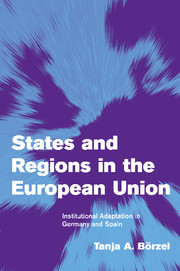Book contents
- Frontmatter
- Contents
- List of figures
- List of tables
- Acknowledgements
- List of abbreviations
- Introduction
- Part I Europeanization and domestic institutional change: A historical institutionalist approach
- Part II Reinforcing cooperative federalism: Institutional adaptation to Europeanization in Germany
- Part III Transforming competitive regionalism: Institutional adaptation to Europeanization in Spain
- 7 The Spanish State of Autonomies as a form of competitive regionalism
- 8 Toward a framework of joint decision-making: The impact of Europeanization on the territorial institutions of Spain
- 9 Conclusion
- Part IV Sharing versus shifting the costs of adaptation: The Europeanization of environmental policy-making in Germany and Spain
- Conclusions: Toward convergence in Europe?
- Appendix: The major EU environmental policies of the policy study
- List of references
- Index
9 - Conclusion
Published online by Cambridge University Press: 22 September 2009
- Frontmatter
- Contents
- List of figures
- List of tables
- Acknowledgements
- List of abbreviations
- Introduction
- Part I Europeanization and domestic institutional change: A historical institutionalist approach
- Part II Reinforcing cooperative federalism: Institutional adaptation to Europeanization in Germany
- Part III Transforming competitive regionalism: Institutional adaptation to Europeanization in Spain
- 7 The Spanish State of Autonomies as a form of competitive regionalism
- 8 Toward a framework of joint decision-making: The impact of Europeanization on the territorial institutions of Spain
- 9 Conclusion
- Part IV Sharing versus shifting the costs of adaptation: The Europeanization of environmental policy-making in Germany and Spain
- Conclusions: Toward convergence in Europe?
- Appendix: The major EU environmental policies of the policy study
- List of references
- Index
Summary
Part III of this book has shown that Europeanization has exerted similar pressures for adaptation on Spanish territorial institutions as it has in Germany. Due to the differences between the Spanish State of Autonomies and the German Federal State, Europeanization has resulted in partly different forms of institutional misfit, which have, however, caused a comparable degree of adaptational pressure due to an uneven distribution of “say and pay”. On the “say” side, European institutions have allowed the Spanish and the German central states to access exclusive competencies of the regions. In this respect, the CCAA were more affected than the Länder because of their larger sphere of autonomous competencies. At the same time, the CCAA did not have any co-determination powers in central-state decision-making to lose, whereas the Länder did, and have consequently suffered most in this area. The CCAA faced the centralization of their implementation competencies, both legislative and administrative. On the “pay” side, CCAA and Länder alike are the main implementers of Community Law and, thus, have to carry the burden of implementing policies, in whose formulation and decision-making they did not participate (“pay without say”). In both countries, this uneven distribution of “say and pay” has caused a redistribution of resources, which has changed the territorial balance of power in favor of the central state.
Unlike German cooperative federalism, however, the informal institutions of Spanish competitive regionalism have prohibited rather than facilitated the adaptation of formal institutions to this shift of power.
- Type
- Chapter
- Information
- States and Regions in the European UnionInstitutional Adaptation in Germany and Spain, pp. 148 - 150Publisher: Cambridge University PressPrint publication year: 2001



